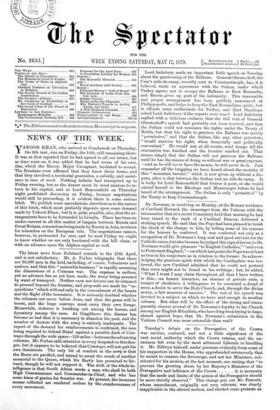Dr. Newman, in receiving on Monday, at the Roman residence
of Cardinal Howard, the messenger from the Vatican with the information that at a secret Consistory held that morning he had been raised to the rank of a Cardinal Deacon, delivered a striking speech. He said that the Pope had been pleased to break the shock of the change to him, by telling some of his reasons for the honour he conferred. It was conferred not only as a recognition of Dr. Newman's long zeal and good services for the- Catholic cause, but also because he judged this sign of favour to Dr. Newman would give pleasure "to English Catholics," "and even to Protestant England,"—on which last point the Pope was at least as true in his conjecture as in relation to the former. In acknow- ledging the gracious spirit with which the Cardinalate was bes- towed, the new Cardinal admitted that he could not pretend that error might not be found in his writings ; but, he added, "What I trust I may claim throughout all that I have written is this,—an honest intention, an absence of private ends, a temper of obedience, a willingness to be corrected, a dread of error, a desire to serve the Holy Church, and, through the divine mercy, a fair measure of success." The rest of his speech was devoted to a subject on which we have said enough in another column. But what will be the effect of the strong and trans- parently sincere avowal of Dr. Newman's loyalty to his Church among our English Ritualists, who have long been trying to hope, almost against hope, that Dr. Newman's submission to the Vatican Council was more ostensible than real?


































